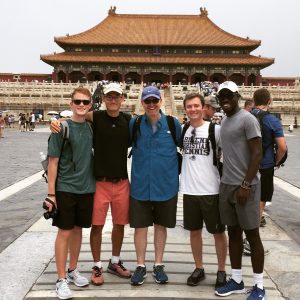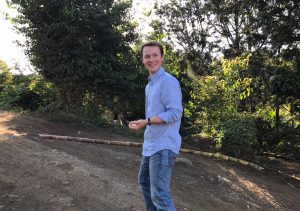Casey McMullin is a senior financial management major from Colorado Springs, Colorado. This summer, Casey traveled around the world interning and studying abroad. He visited countries in Africa and Asia. Casey returned to Abilene with a changed perspective, new skills, and many stories.
Q: Where did you go and what did you do in Africa?
A: I went to Arusha, Tanzania. It was two hours from Mt. Kilimanjaro, which was amazing to see every morning when we woke up. We were based at Neema Village, where they house 40 babies and at-risk or abandoned children. I helped start a microfinance program so that local mothers can start businesses for additional income.
- Casey with children in Neema Village
- Casey with a child in Tanzania.
Q: Did working with microfinance in Tanzania change your perspective on business?
A: I think that the most challenging part was the difference between Tanzanian and American business and legal environments. When we were building the microfinance program, we had to do everything in accordance with American not-for-profit laws and Tanzanian laws so that they could get loans. A better understanding of business law would have helped.
The nature of business was very different in Tanzania. It was very simple. I had to go back to the foundations and teach the locals so that they could understand what we were doing. At the same time, I had to maintain the financial complexities I had learned so as to ensure that the program would function properly and long past our departure.
Q: What was the most impactful interaction you had with a local?
A: I think that the coolest thing that happened to me happened at the very end of our time in Africa. We only did one test run of a business since it took a long time to set up. We were working with a woman who started a chicken business. We helped her get funding for a bigger coop, food, and medicine for the chickens. On our last day, we were saying goodbye and hugging her. She gave us eggs and then ran to chop down her whole sugar cane. We told her not to, but she cut it down regardless and gave it to us as a thank you.
- Casey and Lexi Koon, junior, with the woman who started a chicken business.
- Casey with the sugar cane that the woman gave in gratitude.
Q: Where did you go and what did you do in China?
A: We were based in Shanghai and also traveled to Beijing and Hong Kong on the weekends. I took a crash course in basic principles of entrepreneurship and Chinese principles of entrepreneurship. We examined

Casey sitting on the Great Wall of China.
the different opportunities to and ways of starting a company in China, visited start-ups, and talked with a number of entrepreneurs, both natives, and expatriates.
Q: What was different about studying business in another country?
A: One thing that struck me was the sheer size of China. The massive populations changed the way they did business in ways I didn’t think about. It was also interesting to see similar priorities between us as well as what each country values more. For example, the Chinese emphasize education starting at a young age and it was interesting to see how that affected business and the way people were.
Q: Did you have a big culture shock moment?
A: Oh yeah. After spending 8 weeks in Africa where there are no Chinese people, we were shocked as soon as we stepped off the plane. There were so many people walking around and they all seemed so busy. There was a class of 30 kids running around and yelling at each other in Chinese and the only thing we could think was “we are in China.”

Nicholas Weirzbach, Steven Yang, Dr. Andrew Little, Casey, and Jack Oduro smile in front of the Forbidden City.
Q: Compared to interning, how was study abroad different when it came to cultural immersion?
A: In Africa, I felt like I needed to immerse myself a lot more. I think that this was because I was there to help other people rather than studying for my own benefit. Being there for others drove me to learn the language and immerse myself more since I was not there for myself.
Q: Overall, what was your biggest takeaway from this summer?
A: Take any risk. This summer, I saw just how much people live with nothing. I think that the fear of losing something can hold people back, but that is a mindset that you just can’t live with. You should be doing what you love. Look for an outcome rather than a consequence.



